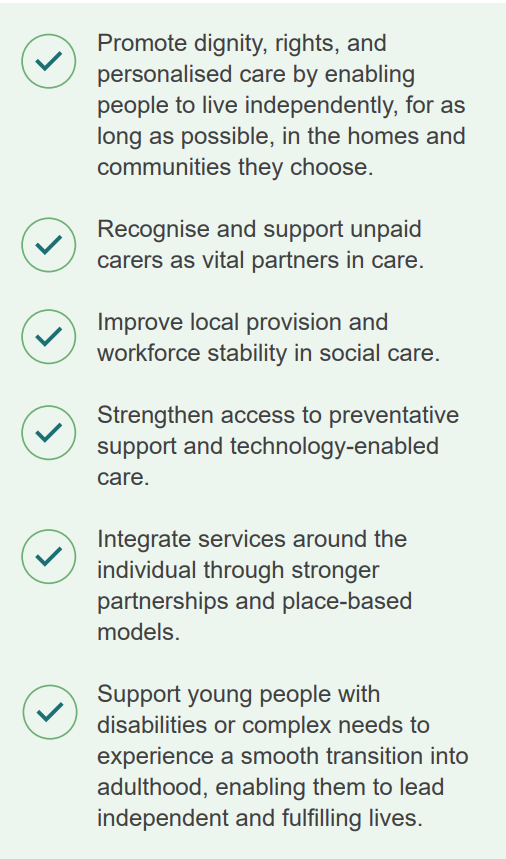What it means and why it matters
Everyone in Devon deserves to live with dignity, independence, and connection, whether they are growing older, living with a disability or a long-term condition, or caring for someone else. Supporting independence is not only a matter of rights and respect, it is a foundation for healthy communities, sustainable services, and personal wellbeing.
This priority reflects our role in adult social care, public health, and community partnerships. It acknowledges the systemic pressures people face, from isolation and poor housing to the complexity of navigating services. It recognises the extraordinary value and role of unpaid carers, the importance of personalised support, and the urgent need to reform fragmented systems so that people only need to tell their story once.
We all want to live in the place we call home, with the people and things that we love, in communities where we look out for one another, doing the things that matter to us. Our aim is to move away from crisis-driven care and towards a preventative, relational, and person-centred approach that enables people to live full and connected lives, Working with NHS partners to deliver the NHS 10-year plan’s three strategic shifts — delivering more care in communities, embracing digital innovation, and prioritising prevention – we will ensure people receive the right support, at the right time, in the right place, empowering them to live the lives they choose.
We recognise the strong interdependence between our services and those of the NHS and have established enduring partnerships that support the delivery of integrated adult social care and public health across Devon. These relationships, underpinned by shared roles and governance, provide a solid foundation for future collaboration. As both organisations face increasing resource pressures and adapt to structural changes within the integrated care board, maintaining trust and fostering effective engagement at both leadership and operational levels will be critical. Achieving better outcomes will depend on our ability to work together, with continued focus on engaging providers, community partners, and the Voluntary, Community, and Social Enterprise (VCSE) sector.
Our six commitments are set out below with our four-year goals and activities.

Commitment: Promote dignity, rights, and personalised care by enabling people to live independently, for as long as possible, in the homes and communities they choose.
Goal: Promote independence, dignity, and choice in care and support.
We will:
- Personalise care through reablement, strengths-based practice, and planning that is led by the individual and what matters most to them.
- Expand access to personalised options that support independent living, including supported living arrangements and flexible models of care that enable people to live well in their communities.
- Ensure dignity, rights, and relationships are embedded in all care assessments and reviews, always guided by the person’s voice and their goals and aspirations.
Commitment: Recognise and support unpaid carers as vital partners in care.
Goal: Recognise, value, and support unpaid carers.
We will:
- Launch and implement a Devon Carers’ Charter, including a clear focus on young carers.
- Improve access to replacement care, financial advice, peer support, and training.
- Involve carers in care planning, service design, and commissioning.
Commitment: Improve local provision and workforce stability in social care.
Goal: Strengthen the sustainability of local care services and workforce stability.
We will:
- Uphold our Care Act duties to shape and maintain a diverse, high-quality care market that meets current and future need — ensuring people can access the right care, in the right place, at the right time.
- Implement fair and sustainable fee models and invest in our in-house care services where viable — ensuring the care market is responsive, reliable, and fit for the future.
- Work with the health and social care sector to improve recruitment, training, and retention, and champion fair pay, good working conditions, and career development.
Commitment: Strengthen access to preventative support and technology-enabled care.
Goal: Give people more control over their care through personalised digital solutions and self-management tools.
We will:
- Expand access to technology-enabled care, including remote monitoring, telecare, and smart home tools, to help people manage their health and wellbeing safely at home.
- Reduce pressure on traditional services by investing in digital infrastructure, promoting digital inclusion, and supporting community-based solutions that are cost-effective and adaptable to local needs.
- Collaborate with VCSE partners to co-design and deliver technology-enabled support that is personalised, accessible, and rooted in community connections.
Commitment: Integrate services around the individual through stronger partnerships and place-based models.
Goal: Work with the NHS and other partners to improve outcomes for individuals.
We will:
- Strengthen place-based partnerships by supporting integrated neighbourhood teams and collaborative working across health, care, and community services.
- Improve coordination across pathways including hospital discharge, recovery, and long-term care — ensuring continuity, responsiveness, and person-centred planning.
- Align shared priorities, resources, and accountability through joint planning, pooled funding arrangements, and governance frameworks that reflect our collective commitment to better outcomes.
Commitment: Support young people with disabilities or complex needs to experience a smooth transition into adulthood, enabling them to lead independent and fulfilling lives.
Goal: Young people with a disability of complex are supported to thrive.
We will:
- Continue to strengthen integrated working across adults’ and children’s services, ensuring a seamless experience and eliminating gaps in support during transition.
- Ensure early, co-ordinated planning for adulthood, working with young people, families, education, and health partners to start transition planning early – focusing on what matters most to the individual and ensuring continuity of care and support.
- Co-design support that reflects each young person’s strengths, aspirations, and goals – enabling access to further education, employment, housing, and community life, so they can thrive and live with purpose.